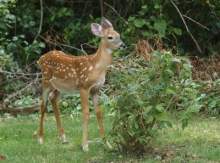Tips For Gardening With Deer And Rabbits
Tuesday, March 15 | Gardening Info
Gardening is a great way to connect with the environment and commune with wildlife, but nobody wants to spend a weekend planting a gourmet feast for the local fauna. Wildlife is great, so long as it steers clear of your hard work. Here are some ideas for discouraging, but not harming some common backyard guests.
Deer:
Beautiful, graceful and hungry. Isolated deer problems can usually be controlled with non-toxic repellents. Perimeter repellents like predator urine will keep them out of a particular area while taste deterrents like Liquid Fence will keep them away from specific plants. Below are some plants that are generally disliked by deer, but there’s no guaranteeing they won’t be ‘sampled’. The only sure fix for deer is a 6 ft.+ fence.
Deer Resistant Perennials:
| Achillea | Aconitum | Ajuga | Alchemilla | Allium |
| Artemesia | Astilbe | Babtisia | Big Bluestem | Calamagrostis |
| Cimicifuga | Convallaria | Coreopsis | Chrysanthemum | Dicentra |
| Digitalis | Echinacea | Helleborus | Iris | Lamiastrum |
| Lamium | Liatris | Lupine | Miscanthus | Monarda |
| Narcissus | Nepeta | Paeonia | Poppies | Perovskia |
| Polemonium | Polygonum | Pulmonaria | Rhubarb | Rudebeckia |
| Salvia | Sedum | Stachys | Yucca |
Deer Resistant Annuals:
| Ageratum | Cosmos | Heliotrope | Marigold | Nasturtium |
| Petunia | Snapdragon | Alyssum | Vinca | Cleome |
| Dusty Miller | Castor Bean |
Rabbits and Rodents:
Harder to stop with fencing, repellents offer a convenient tool for managing these smaller guests. Try castor oil for moles and Milorganite or blood meal for rabbits, mice and squirrels. The latter two are great for edibles as they applied to the soil and not the plant itself. Milorganite and blood meal also enrich the soil with nitrogen for a little extra boost





